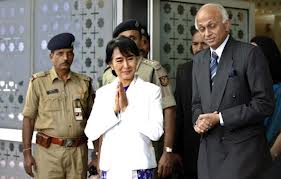
Ms. Suu Kyi, who is visiting India on the invitation of UPA Chairperson Sonia Gandhi, will deliver the Jawaharlal Nehru Memorial Lecture here on Wednesday.
The pro-democracy leader was received at the Delhi airport by Foreign Secretary Ranjan Mathai.
Visit to alma mater
During her nearly week-long stay, Ms. Suu Kyi will visit her alma mater, Lady Shri Ram College in Delhi, where she will interact with the faculty and students.
She will be travelling to Bangalore where she will visit the Indian Institute of Science and the Infosys campus. She is also scheduled to tour rural areas in Andhra Pradesh to gain a first hand impression of rural development and women’s empowerment programmes in India.
Ms. Suu Kyi spent several years in India during her early days when her mother Daw Khin Yi was Ambassador to India.




Comments
Add new comment